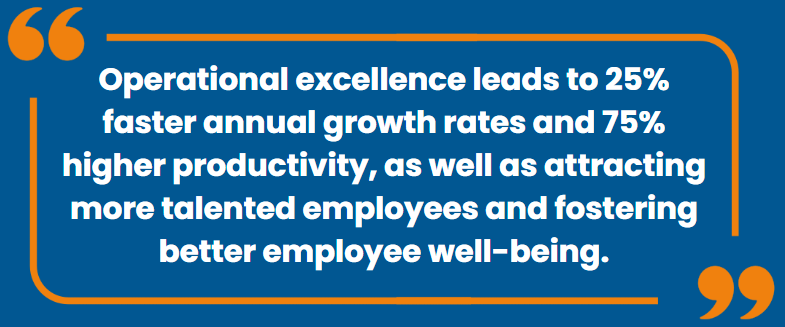Operational excellence seems like a lofty goal for many firms, but putting it into practice is not only possible — it’s necessary to reach growth opportunities and provide a top-tier client experience.
Achieving operational excellence isn’t the responsibility of one leader or advisor. It requires a culture shift to transform the firm and embrace growth and improvement.
Why Operational Excellence Matters
Operational excellence means firms and advisors are taking advantage of all the available tools to work efficiently, often with two principles in mind:
- Leveraging data, using AI and other technology to make transactions and operations as intuitive as possible
- Touching as few transactions as possible and designing straightforward systems
It’s not just about operations, there are countless benefits to operational excellence for every aspect of the business. It provides a better experience for clients, more efficient processes for employees and advisors and higher margins and lower risks for shareholders.
Research from the Harvard Business Review found that operational excellence leads to 25% faster annual growth rates and 75% higher productivity, as well as attracting more talented employees and fostering better employee well-being.

Operational excellence also drives scale, improves margins, and frees time for advisors to spend more time with clients. That leads to a better client experience and more referrals and growth opportunities.
There’s a reason Aaron Berthold, VP of Operations at Ameritas Investment Company, said in a Docupace Webinar Roundtable: “If you don’t have a culture of operational excellence, you won’t achieve what you need to on a day-to-day basis.”
Achieving operational excellence requires effort from everyone in the firm. It isn’t a one-time action or box you can check, but a widespread culture throughout the firm to continually improve, evolve, and reduce friction.
Set a Vision and Lead by Example
Creating any culture takes time and effort, especially from firm leaders. Change doesn’t happen overnight. It starts with a clear vision of what the culture can become. That vision needs to include every aspect of the firm and the role each employee and advisor can play in reaching the goal. A back office employee might not interact directly with clients, but they have an incredible impact on streamlining processes and working toward operational excellence.
Researchers from PwC put it this way: “Developing a strategy that aligns people, processes, and assets will make sure you have a clear understanding of your organization’s goals and the confidence to get there fast, creating an accelerated path to turning your company’s operational vision into a reality.”
What does a culture of operational excellence look like? The answer will vary in each firm but often includes a culture built on continuous learning and improvement. When firms work toward operational excellence, they embrace new technology, encourage employees to speak up about bottlenecks, and dedicate everyone to providing a strong client experience.
No matter the size, Tom Gooley, Chief Operating Officer at Cetera Financial Group, says every firm needs to continually discuss and promote an operational excellence culture. Leaders should set an example and live the culture. As other advisors and employees see the example of embracing operational excellence, they’ll follow the same path.
Maintaining and Strengthening the Operational Culture
Setting a vision and sharing the culture doesn’t automatically lead to lasting change. Embracing a culture of operational excellence means being open to feedback and improvements.
Many firms systemize their feedback by gathering advisors and employees regularly or creating a task force to meet periodically and candidly discuss what is and isn’t working. These groups and feedback sessions can provide valuable insights into areas for improvement and opportunities for growth.
Strengthening a culture of operational excellence requires transparency and communicating with the firm about changes and initiatives, especially around new technology and regulatory changes. As advisors and back-office employees see the impact of their work on streamlining operations and growing the firm, they will become more engaged in reaching operational excellence.
Operational excellence is crucial to any successful firm. And it requires a culture of continual improvement and learning. These changes take time and can lead to incredible growth opportunities.
To learn more about how Docupace can help your firm reach operational excellence, click here for a free demo.




